IMPORTANT NOTE: If your home is in Macomb County, the Health Department requires a separate well and sewer inspection prior to transfer of the property, following is a link to approved evaluators in Macomb Macomb County Well/Septic Evaluators
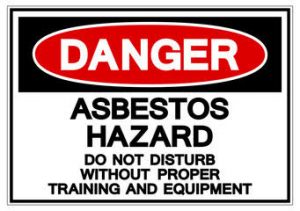 Asbestos was used in home construction for many years in a variety of manners. During a standard home inspection we will identify areas or items that we suspect may contain asbestos. Based on your intentions, if you plan to disturb the suspected area, we can recommend appropriate testing. We do offer testing of products for Asbestos, please see our pricing page for more details, Expert Home Inspections Services.
Asbestos was used in home construction for many years in a variety of manners. During a standard home inspection we will identify areas or items that we suspect may contain asbestos. Based on your intentions, if you plan to disturb the suspected area, we can recommend appropriate testing. We do offer testing of products for Asbestos, please see our pricing page for more details, Expert Home Inspections Services.
General Home Inspection
- Our inspector has been through extended training through InterNACHI to learn how to conduct a home inspection during this COVID pandemic.
- Our inspector will wear proper PPE at all times. This includes a mask, gloves, and shoe covers. If there is reason to believe there was someone in the home who is positive with COVID-19, our inspector will also wear a respirator and full Tyvek suit.
- In general, we ask that nobody is present in the home when conducting the inspection. Once the property has been inspected, the client will then have the option of walking through the home with the inspector to point out deficiencies, or to go through the report with the inspector on a tablet or computer via Teleconference or Zoom meeting. If someone would like to follow the inspector we understand, and long as they are healthy, wear a mask, and maintain distance as feasible, we will accommodate this.
- Our staff will do its best to always maintain at least 6′ from any other persons.
- All equipment used during an inspection will be thoroughly disinfected between each inspection.
- EHI will continue to stay updated with any developments regarding COVID, and proper safety procedures.
We hope you understand just as our attention to detail in your inspection is to protect your family, our abundance of caution with COVID is an effort to protect you, your family, the families of our other customers, and our own family at home. We understand rules and information are changing by the minute, and our goal is to ALWAYS error on the side of caution.
If you have any other concerns or questions please do not hesitate to ask. If you are concerned about something not listed please let us know and we will work to accommodate your needs.
Our home inspection service does verify the basic function of the sewer system. This is typically done by heavily loading the drain system with a large flow of water for a sustained period of time to verify there are no significant issues with the drain system. If our inspection does indicate there may be an issue with the sewer line, we can supply you with contacts of local companies who specialize in sewer inspections.
Because the Infrared (IR) camera detects heat instead of visible light, it has the unique ability to see “through” or into a wall to see how well it is insulating, or to detect any heat variations behind the surface.
Thermography inspections can also be used to inspect electrical panels to identify potentially overloaded circuits. Further, this type of camera and inspection can be useful in identifying moisture in certain walls and flooring materials, allowing for the identification of potential mold or mildew.
For more information on thermography, please visit our resources page.
This video below shows in stark clarity how beneficial this type of inspection can be!
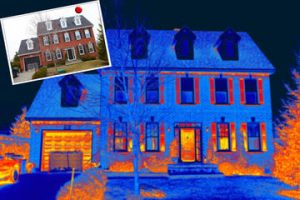 To be clear, this type of inspection is only a tool in the arsenal of a well-equipped inspector. Just as important, if not more important is training and knowledge the Inspector has in reading the infrared/thermography scans. Similar to looking at an ultrasound, MRI, or even x-ray, while some issues such as a broken bone may be obvious, there are many details only a trained eye can identify.
To be clear, this type of inspection is only a tool in the arsenal of a well-equipped inspector. Just as important, if not more important is training and knowledge the Inspector has in reading the infrared/thermography scans. Similar to looking at an ultrasound, MRI, or even x-ray, while some issues such as a broken bone may be obvious, there are many details only a trained eye can identify.
So, to properly answer this question, this type of inspection can help lead the inspector to identify a multitude of different issues that are typically more hidden. Some of these things include: Overloaded electrical circuits/panels, missing insulation, water intrusion, mold and mildew, foundation cracks/leaks, broken radiant floor heat, venting issues with appliances, and a multitude of other issues that can cause potential problems and cost money in the operation of your home.
Finding warranty repairs after a house has been built is far more the rule than the exception. Most of the time, many of these repairs have very little if anything to do with the quality of work from your builder. As homeowners we must understand we are building a structure in an environment that is subject to a multitude of forces far beyond the control of any builder or engineer. Even with the best site preparation and planning things such as ground settling, extreme temperatures, groundwater flooding, etc can cause building materials to fail and not perform as designed. What’s more, a home is the combination of parts and labor from dozens of suppliers and laborers, and even under the best of conditions, mistakes do happen. This is why it is ALWAYS best to have a professional inspect your home to make sure any covered repairs are addressed before the responsibility falls completely on you!
The time to find these issues is now, while they can be fixed under warranty, and BEFORE they cause more expensive damage to your home.
Information about Express Warranty
State of Michigan Complaint Process
In addition, if you are having difficulties, an 11th Month Inspection can help you identify all of the problems, and provides you with an unbiased documentation of the difficulties you are experiencing.
 Homes are complex systems, as an inspector I work hard to make sure I find any issues that exist in your home that could cause you a problem. With the Buy Back Guarantee, you now have even more confidence in your purchase. If for any reason you find an issue with you new home within 90 days of closing, and I missed it on my report, InterNACHI will BUY YOUR HOME BACK for the full purchase price! There are some simple requirements, but this extra insurance is provided to you at NO COST. If you follow the link below, you can review the program details directly from InterNACHI. InterNACHI Buy-Back Guarentee
Homes are complex systems, as an inspector I work hard to make sure I find any issues that exist in your home that could cause you a problem. With the Buy Back Guarantee, you now have even more confidence in your purchase. If for any reason you find an issue with you new home within 90 days of closing, and I missed it on my report, InterNACHI will BUY YOUR HOME BACK for the full purchase price! There are some simple requirements, but this extra insurance is provided to you at NO COST. If you follow the link below, you can review the program details directly from InterNACHI. InterNACHI Buy-Back Guarentee
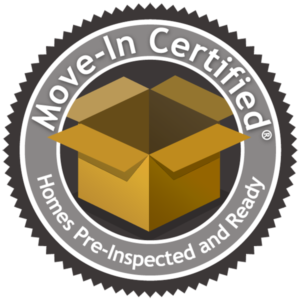 This is a service designed primarily for the seller. When you are selling your home, you want to make sure you are able to command top dollar for it on the market. With a move in certified inspection you and your Realtor will be able to provide prospective buyers with a full home inspection report showing them there are no issues before they even make an offer.
This is a service designed primarily for the seller. When you are selling your home, you want to make sure you are able to command top dollar for it on the market. With a move in certified inspection you and your Realtor will be able to provide prospective buyers with a full home inspection report showing them there are no issues before they even make an offer.
Additionally, the best time to find out there is an issue, is before an offer comes in, not when a prospective buyer is making an offer. Knowing a home is up to par when it goes on the market is a great way to save money that could be lost after a buyers inspection.
To book your inspection and get your home certified click here. For more information on this program, check out InterNACHI’s information on this program Click here.
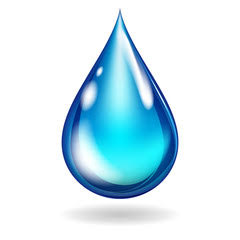 Water Quality/Testing
Water Quality/Testing
Air Quality/Testing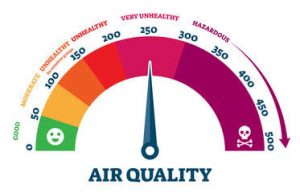
Additionally, If you, or a member of your family suffers from severe allergies or breathing sensitivities such as asthma, or COPD, having your air quality checked could be an important benefit to your quality of life.
Replace your furnace filter – Your furnace filter should be changed on a regular basis (every 90-days) with QUALITY air filter. The cheap $2/$4 filters do little more than keep large chucks of dust and debris out of your blower fan.
Vacuum dust and debris from your heat registers regularly to prevent your HVAC system from spreading more dust and particulates.
Make sure bathrooms and kitchens are properly vented to get moisture and odors moved outside.
Have duct work inspected and cleaned as needed to prevent the spread of dust and bacteria.
Ensure proper ventilation and air movement in any damp areas such as basements or laundry areas.
Below is an interesting video on how simple house plants can improve your air quality…
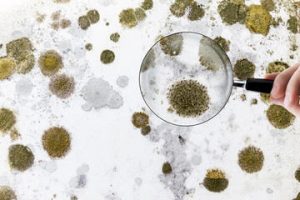 Mold
Mold
First, and most importantly is complications with health. Mold can lead to a wide range of illnesses, primarily associated with respiratory complications. From triggering asthma flare ups to causing respiratory infections, mold can be very damaging to our lungs.
Second, the mold itself can often be destructive to the building material to which it adheres. Mold will help to destroy paint finishes, ruin carpet and fabric, and cause wood and drywall to rot.


 About EHI
About EHI